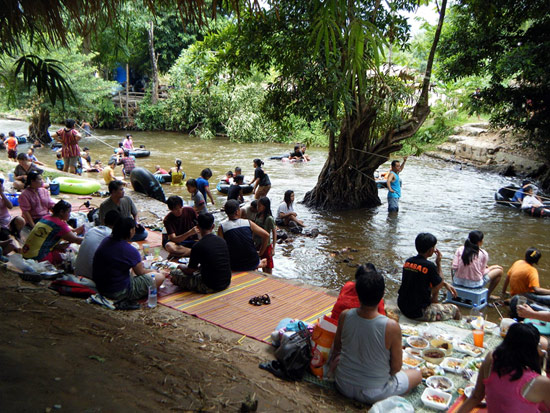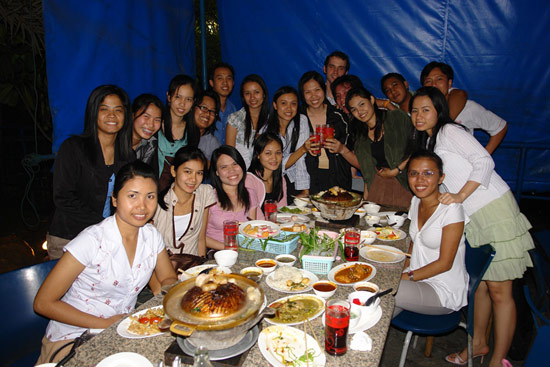Culture and Society: Time Orientation
Perception of Time
In Thailand, time is regarded as a meandering stream, trickling forever through the Buddhist cycle of birth, death, and reincarnation. This is a fluid and patient process that does not culminate in some final end point. Thus, Thais take the view of Mai pen rai (Never mind): time is beyond the control of mere mortals.
Aside from the Buddhist majority, there are small communities of Muslims and Jews who take a more a linear view of time and subscribe to a notion of an afterlife.
Thais have a long view of time which reaches from their ancestral past into the distant future. They exhibit a high regard for traditions, history, ceremonies, and family roots, as well as a concern for long-term viability. The present is viewed as an inevitable link between the two, so hurry is unnecessary.
Traditional Calendar
The traditional Thai calendar is based on lunar and agricultural cycles. Each month is a lunar cycle consisting of 29 or 30 days. The first lunar month usually begins in December, but it is not considered the new year (Wan Troot). The new year begins with the tilling of the ground. As the ancestors of the Thai migrated south from Southern China, the warmer climate and more regular daylight hours allowed planting and harvesting to occur later in the year. Consequently, the new year also began later, resulting in the current placement of the new year in the fifth or sixth lunar month. The Thai new year also signals a progression in a cycle of 12 animal years with astrological characteristics. Because the lunar year is about 10 days shorter than a solar year, the Thais compensated by adding an extra month approximately every three years.
The Thai solar calendar, called Suriyakati, is the legal calendar of Thailand, although important dates, such as holidays and birthdays, are still determined by the lunar calendar. The solar calendar, instituted by King Chulanlongkom in 1888, is a version of the Western Gregorian calendar. It counts years according to the Buddhist Era (BE), which centers around the parinibbana (final nirvana, or death), of Gautama Buddha. In Thailand, the parinibbana is considered as year zero and is estimated to have occurred in the Gregorian year 543 BCE.
Attitude Toward Time
Although attitudes toward time vary with locale and situation, the general Thai approach is summed up in the phrase, Mai pen rai (It doesn't matter, or Never mind). Thai people exhibit patience and a sense of humor whether delayed for minutes, hours, or even days. Thai society has certain delays built into it, with traffic jams commonplace in cities like Bangkok and bureaucracy rife in everything from government departments to low-end hotels. The correct approach to this, so Thais believe, is to stay cheerfully composed. Stressing over punctuality is regarded as a sign of weakness. Patience is paramount, along with the confidence that problems will eventually be resolved by the natural course of time.
On a practical level, anyone who hurries around in the Thai heat is liable to damage his or her health. Natural hazards can also interrupt schedules, both personal and professional. Furthermore, Thailand’s background as an agrarian culture prompts many—in the countryside especially—to organize time according to nebulous seasons rather than into discrete units.
Thais are polychronic in the the use of present time, with tasks and duties subordinate to interpersonal relations. Thus, a Thai may simultaneously be involved in various activities based on the needs of people to whom he or she is currently obligated. Work time and personal time exist simultaneously rather than sequentially.
Social Engagements
Meeting times for social engagements are approximate, so it's common for Thais to arrive in the general time frame rather than at the stroke of the clock. The individual who is kept waiting simply passes the time with reading, socializing, watching television, or observing the surroundings. The Thai urge to please guests prevents expression of displeasure at tardiness.
Thais frequently entertain in restaurants or hotels, where people tend to arrive more closely to the planned starting time to avoid inconveniencing the establishment. Those lucky enough to be invited to a Thai home will enjoy the generous hospitality evident in the Thai saying, "Whoever comes to our house will be welcome." When invited to a social occasion, a guest should take care to arrive at the stated time or shortly thereafter, so as not to surprise the host/hostess before he or she is ready and cause the host to lose "face." Arriving too late can also cause a host to lose "face" if food or drinks have run low.
Business Engagements
The commercial world is exempted from Thai laxness about punctuality. Typically, urban businesspeople will turn up to meetings and working lunches/dinners at the pre-agreed time. They may be a few minutes late due to traffic or weather issues, and this is normally accepted by other delegates in the spirit of Mai pen rai. If more than a few minutes’ tardiness is on the cards, it is polite to phone ahead and warn others of this eventuality. Given that many Thai businesspeople have learned clock-directed timekeeping from the West, foreigners are expected to be punctual too.
Once a meeting begins, negotiations proceed at a glacial pace. This is because Thais speak indirectly to one another, skirting around points of disagreement and hinting at them with body language, rather than addressing them head-on. For example, Thais will seldom say "No" just to avoid confrontation, even if "No" is exactly what they mean. These are yet more manifestations of saving "face." Thais generally refuse to do business with people with whom they have not first developed a cordial relationship. It can take several meetings to "sound out" a potential business partner.
Conferences and meetings are customarily booked a month in advance and confirmed with several phone calls as the date approaches. In recent years, the problem of traffic gridlock has been addressed by scheduling appointments outside of rush hours.
As Thai organizations see it, production and service deadlines should not be fixed according to the diktats of a clock or a calendar. Rather, they are vague and mutable windows. If circumstances or personnel change, postponements will be made without fuss.
Article written for World Trade Press by Tom Sykes.
Copyright © 1993—2025 World Trade Press. All rights reserved.

 Thailand
Thailand 

